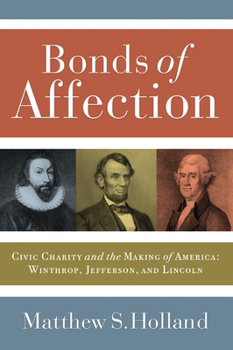Bonds of Affection: Civic Charity and the Making of America--Winthrop, Jefferson, and Lincoln
(Part of the Religion and Politics Series)
Notions of Christian love, or charity, strongly shaped the political thought of John Winthrop, Thomas Jefferson, and Abraham Lincoln as each presided over a foundational moment in the development of... This description may be from another edition of this product.
Format:Paperback
Language:English
ISBN:158901183X
ISBN13:9781589011830
Release Date:October 2007
Publisher:Georgetown University Press
Length:321 Pages
Weight:1.00 lbs.
Dimensions:0.7" x 6.0" x 8.9"
Grade Range:Postsecondary and higher
Customer Reviews
2 ratings
An optimistic and heartwarming look at politics for a change.
Published by Thriftbooks.com User , 16 years ago
One of the hallmarks of true greatness of character is that of philanthropy. Be it the 'widow's mite' or the millionaire's largess. "Let All Your Things be Done with Charity". "Bonds of Affection : Civic Charity and the Making of America - Winthrop, Jefferson, and Lincoln" follows three great men and how their acts of charity shaped our country as it is today for the better. Author Matthew S. Holland, an assistant professor at the Department of Political Science at Brigham Young University highlights the brilliant and compassionate statesmanship of the three men and brings them into a new light. Highly recommended for both American history and political science shelves as an optimistic and heartwarming look at politics for a change.
Charity as the Form of Political Bonds
Published by Thriftbooks.com User , 16 years ago
Bonds of Affection: Civic Charity and the American Founding Professor Matthew Holland has written a book with a great back cover filled with the effusive praise of well known political thinkers. The inside is even better. He takes seriously both tablets of biblical religion (the vertical love of God and the horizontal love of neighbor) and proposes that American civic life is best understood as a form of this Christian love. He understands the Greeks but he is no Greek. With most thinkers, he does not find eros in political life but neither does he build civic bonds on the philia of fraternal friendship. When he says civic charity he means a civic life animated by agape-that distinctive Christian love that "includes concern for another's standing before God even when others mean us harm." This of course has implications for how we treat our enemies and our fellow citizens. Does this make Holland a hopeless romantic pacifist -not a serious player in an age of war? Conservative Robert Kaplan has written a book called Warrior Politics: why leadership demands a pagan ethos. Liberal Mike Nichols has made a movie-Charlie Wilson's War showing the continuing James Bond fantasy of the irreligious patriot warrior who kills the bad guys while hot tubbing with eager female flesh. Both of these writers are insulting and dismissive of the capacity of a full Christian ethic to deal with either the desires of a man's loins in lust or the demands of his chest in war. Not so in Mr. Holland's opus. Holland finds agape informing the language and political goals of American leaders for two centuries by studying several key authors and texts: John Winthrop(1630-A Model of Christian Charity); Thomas Jefferson(rough draft of the Declaration of Independence-1776 and his First Inaugural Address-1801); and Abraham Lincoln(Second Inaugural-1865). Holland takes seriously Christian charity as a realistic way to deal with public life. He convincingly argues that for both Lincoln and Jefferson it was the realistic crucible of office which forged a deeper sensibility of the necessity of the bonds of charity in civic life. Holland's treatment of Jefferson is especially careful. Holland does not play the Christian alchemist turning Enlightenment rights into Christian love but he reminds us that even the most rights oriented of Jefferson's writings ends with a bond -"we mutually pledge to each other our lives, our fortunes and our sacred honor." Holland reminds us this was no idle pledge. To secure that bond one percent of Americans lost their lives. If Holland finds "bonds to the death" where others only found rights, he also finds analogical political forms in the New Testament where others tend to look for political narrative in the Old Testament alone. He quite rightly locates the sacrificial duties of soldiers in a pivotal moment in the Christian narrative-Christ's Last Supper when he commands mimesis and then sets out to lay down his life for his fri





